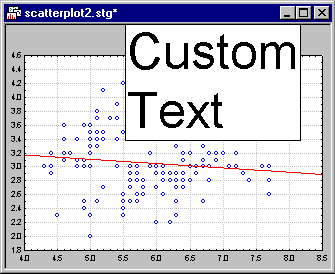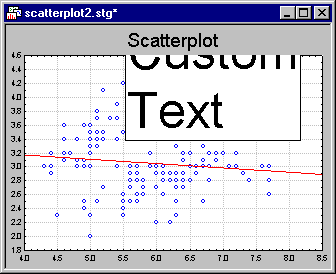
Right-click on an embedded object in a graph, and select Object Properties from the Graph Object shortcut menu to display the Embedded Object Properties dialog. The options in this dialog are used to anchor and format custom graphs, such as graphs copied onto other graphs.
Note: The dialog title bar will display an object identifier number that can be referenced when using STATISTICA Visual Basic code to customize graph objects.
Coordinates. Use the options in the Coordinates group box to anchor the inserted graph either dynamically to a particular plot, or to make the placement of the inserted graph independent of the scaling in the graph. See Anchoring Objects to Coordinates for details regarding the distinction between dynamic and non-dynamic (fixed) anchoring of objects in graphs.
Dynamic (anchor to Plot). Select the Dynamic check box to anchor the shape object dynamically to the plot selected in the Plot drop-down box (see Anchoring Objects to Coordinates).
Options for compound graphs. Compound graphs are those that consist of more than one graph and/or graph type in a single display, such as:
Categorized plots (categorized by one or two variables)
Matrix plots, such as matrix scatterplots, line plots, etc.
Scatterplots with box-plots or Scatterplots with histograms
For these types of graphs, additional options exist to precisely control the location ("anchor point") where the extra graph object is to be attached. Note that different types of dialogs will be displayed depending on the type of compound graph to which you are attaching an object. Refer to Extra Objects in Compound Graphs for additional details.
Line. Select the Line check box to show the line for the shape object (circle, custom drawing, box, etc.). Click the Line button to display the standard Line Properties dialog, to customize the color and line type for the line.
Area. Select the Area check box to fill the background area for the shape object (circle, custom drawing, box, etc.); this is useful when you have grid lines included in the graph, and you don't want those lines to show behind and running through the shape object. Click the Area button to display the standard Area Properties dialog, to customize the background for the shape object.
Clip to graph frame. This option determines whether the respective extra graph object (e.g., line, text, etc.) will only be drawn inside the plot area of the graph, or whether it will also show outside the plot area, in the margins of the graph. If you select this check box, then the object will be "clipped" at the edges of the plot region for the graph, for example:
Clip to Graph Frame: OFF

Clip to Graph Frame: ON

OK. Click the OK button to close the dialog, accepting any changes you have made.
Cancel. Click the Cancel button to close the dialog, ignoring any changes you have made.
Save as Default. Click the Save as Default button to save the current shape object properties as the default properties applied to future shape objects.
Styles. Click the Styles button to display the Graphics Styles dialog. In this dialog you can display and manage the attributes for the Styles for Shape Object; see Graphics Styles for additional details.